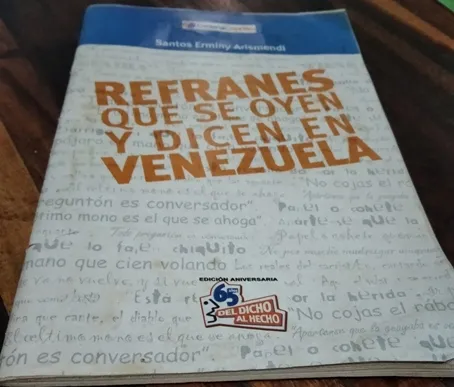

El pilón es un instrumento antiguo, de madera, el cual se emplea para descascarillar y moler el maíz que luego servirá para hacer los distintos alimentos. Emplearlo requiere un gran esfuerzo físico, que puede resultar agotador, pero que es necesario para poder disfrutar del alimento. Por tanto, este es un refrán de advertencia, el cual señala que cada quien tiene que asumir la consecuencia de sus actos, el fruto de lo que ha sembrado, y que esto ha de hacerse con total responsabilidad. Si revisamos en Internet, encontramos un refrán similar, pero de origen mexicano, que dice: “El que siembra maíz, que se coma su pinole”; teniendo un significado parecido, aunque el pinole, hace referencia a un derivado del maíz, es una harina con un aspecto que recuerda al fororo.
Es también un refrán muy sabio, ya que advierte que de quien menos se espera cierta conducta o traición, lo hace. He oído una variante de este refrán, o quizás lo he escuchado más completo: “El que menos puja, echa una lombriz con los ojos azules,” lo cual es una exageración y sinsentido, porque difícilmente encontraremos una lombriz con estas características, pero… puede ocurrir, demostrando que lo más increíble e inesperado puede venir de cualquier persona, hasta de la que consideramos más inocua, tranquila o confiable.
Un río es una curso de agua que tiene un inicio y un final, pues corre en un solo sentido, y al llegar a su tramo final, ya no es posible seguir por él o navegarlo. Al usar este símil en este refrán, se está expresando amenaza o advertencia a alguien más, señalando un límite a la conducta de otra persona, de manera tal que se le deja claro que no puede seguir con el mismo comportamiento, porque le puede generar consecuencias negativas.
Este dicho es similar a aquel que dice: “Anda buscando lo que no se le ha perdido”, y es un refrán que señala la temeridad, estupidez o inconsciencia de parte de alguien, de buscar problemas, peleas o enredos. Es un refrán de advertencia también.
El acto de lamer implica quitar con la lengua, apenas una pequeña porción de la superficie de lo que se lame, jamás será igual a morder, que ya esto sí implica tomar un bocado. Ahora bien, al utilizar este refrán se indica, que con pequeños negocios, con pequeñeces e insignificancias, no se logra bienestar ni riqueza. Es un refrán para señalar el conformismo de alguien o de algo.



The pilón is an old wooden instrument, which is used to husk and grind the corn that will later be used to make different foods. Using it requires a great physical effort, which can be exhausting, but it is necessary to be able to enjoy the food. Therefore, this is a warning saying, which indicates that everyone has to assume the consequence of their actions, the fruit of what they have sown, and that this must be done with total responsibility. If we check the Internet, we find a similar proverb, but of Mexican origin, which says: “He who sows corn, let him eat his pinole”; having a similar meaning, although pinole refers to a derivative of corn, it is a flour with an appearance reminiscent of fororo.
It is also a very wise saying, since it warns that the one who least expects a certain behavior or betrayal, does it. I have heard a variant of this saying, or perhaps I have heard it more complete: “The one who bids the least, casts a worm with blue eyes,” which is an exaggeration and nonsense, because we will hardly find a worm with these characteristics, but... it can happen, showing that the most incredible and unexpected things can come from anyone, even from the one we consider the most innocuous, calm or trustworthy.
A river is a water course that has a beginning and an end, since it runs in only one direction, and when it reaches its final stretch, it is no longer possible to continue along it or navigate it. When using this simile in this saying, a threat or warning is being expressed to someone else, pointing out a limit to the behavior of another person, in such a way that it is made clear that they cannot continue with the same behavior, because it can generate negatives consequences.
This saying is similar to the one that says: “He is looking for what has not been lost”, and it is a saying that indicates recklessness, stupidity or unconsciousness on the part of someone, of looking for problems, fights or tangles. It is a warning saying too.
The act of licking implies removing with the tongue, just a small portion of the surface of what is licked, it will never be the same as biting, which already implies taking a bite. Now, when using this proverb, it is indicated that with small businesses, with trifles and insignificance, neither well-being nor wealth is achieved. It is a saying to point out the conformism of someone or something.

Dear readers, below I place the links of the first 47 posts, in case you want to read them:
Víctor Vera Morales. (Agosto 2004). Refranes y Comidas de Venezuela. Editado por el Instituto Municipal de Publicaciones de la Alcaldía de Caracas.
Santos Erminy Arismendi. (2006). Refranes que se oyen y dicen en Venezuela. Cadena Capriles, Caracas. Venezuela.
- Fotos de mi autoría, tomada con un teléfono REDMI 8A, intervenida con WordArt / Photos of my authorship, taken with a REDMI 8A telephone, intervened with WordArt.
- Los diseños incluidos en esta publicación, han sido elaborados por mi persona con la aplicación CANVA / The designs included in this publication has been made by me with the CANVA application.
In the event that it is required to use the content or images of this post and my other publications, I would be grateful if my authorship (Fabiola Martínez) was made and the corresponding link was cited. Thank you.

 Delegations welcome!
Delegations welcome!

